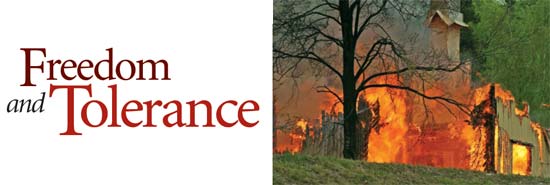Freedom and Tolerance
Lincoln E. Steed March/April 2006
Getting your Trinity Audio player ready...

Does religion promote freedom and tolerance? It is a question that might be asked by any observer of the rioting that has followed publication of cartoons in Denmark that offend Muslims worldwide.
It is a question the United States government must be asking itself. After all, a linchpin of the war on terrorism has been the president's determination to advance democratic norms around the world. While the media inundate the public with tales of roadside bombing woe and officialdom sticks to the line that democratic renewal is proceeding apace, few take the time to really look at what is emerging.
Both Afghanistan and Iraq have new constitutions. Both are superficially modeled on the United States Constitution. Both give not only a preeminent position to the majority Muslim faith, but also give the Koran a veto power over civil legislation. And in Iraq in particular, the religious leaders have become the true arbiters of power.
Perhaps it is not coincidental that in Afghanistan the Taliban is on the comeback trail. Perhaps there is a reason that so many of the million or so Iraqi Christians have left the new Iraq.
It seems to me that a basic flaw here is the assumption that the majority will always act in concert with democratic values. The Founders of the United States Constitution did not share that assumption. That was why they muted pure democracy by a principle of representative government, a complicated system of checks and balances, and the overall restraint of the Bill of Rights and the Constitution, with its distancing of religion from state power.
I have to believe that most Muslims around the world are embarrassed by the at times violent reaction to the cartoons—even if they share the sense of insult. For most of them, Islam is indeed a religion of peace. I want to believe that, even as I am reminded that with any religion worth committing one's life to there is a sense of privilege over lesser belief systems. And when true adherents are granted a degree of secular power, they do not easily share its benefits equally.
For 100 years this magazine has argued for the necessity of a separation between church and state. Of course individuals can often practice their faith conviction adequately within a system that does not have a bright line divide between church and state. But without a clear separation, the prerogatives of church and state, spiritual allegiance and public duty either conflict or cojoin. And while most of the developing Western clich
Article Author: Lincoln E. Steed
Lincoln E. Steed is the editor of Liberty magazine, a 200,000 circulation religious liberty journal which is distributed to political leaders, judiciary, lawyers and other thought leaders in North America. He is additionally the host of the weekly 3ABN television show "The Liberty Insider," and the radio program "Lifequest Liberty."